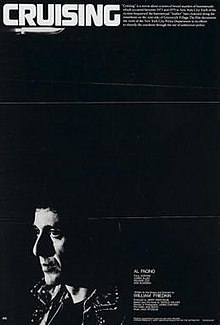Cruising is a 1980 crime film and thriller written and directed by William Friedkin and starring Al Pacino, Paul Sorvino, and Karen Allen. It is loosely based on the novel of the same name by New York Times reporter Gerald Walker about a serial killer targeting gay men, particularly those men associated with the leather scene in the late 1970s. The title is a play on words with a dual meaning because "cruising" can describe police officers on patrol and gay men who are cruising for sex.
| Cruising | |
|---|---|
Original film poster | |
| Directed by | William Friedkin |
| Produced by | Jerry Weintraub |
| Screenplay by | William Friedkin |
| Based on | Cruising by Gerald Walker |
| Starring |
|
| Music by | Jack Nitzsche |
| Cinematography | James A. Contner |
| Edited by | Bud S. Smith |
Production company |
|
| Distributed by | United Artists |
Release date |
|
Running time | 102 minutes |
| Country |
|
| Language | English |
| Budget | $11 million |
| Box office | $19,798,718 |
Poorly received by critics upon release, Cruising performed moderately at the box office. The shooting and promotion were dogged by gay rights protesters, who believed that the film stigmatized them. The film is also notable for its open-ended finale, which was criticized by Robin Wood and Bill Krohn as further complicating what they felt were the director's incoherent changes to the rough cut and synopsis, as well as other production issues.
Screenplay
In New York City during the middle of a hot summer, body parts of men are showing up in the Hudson River. The police suspect it to be the work of a serial killer who is picking up homosexual men at West Village bars like the Eagle's Nest, the Ramrod, and the Cock Pit, then taking them to cheap rooming houses or motels, tying them up and stabbing them to death.
Officer Steve Burns (Al Pacino), who resembles the victims' dark-haired, slim figure image, is sent deep undercover by Captain Edelson (Paul Sorvino) into the urban world of gay S&M and leather bars in the Meatpacking District in order to track down the killer. He rents an apartment in the area and befriends a neighbor, Ted Bailey (Don Scardino), a struggling young gay playwright who does tech support to pay the bills. Burns's undercover work takes a toll on his relationship with his girlfriend Nancy (Karen Allen), due to both his refusal to tell her the details of his current assignment and Burns' developing friendship with Ted, who himself is having relationship problems with his jealous and overbearing dancer boyfriend Gregory (James Remar).
Burns mistakenly compels the police to interrogate a waiter, Skip Lee (Jay Acovone), who is intimidated and beaten to coerce a confession before the police discover Skip's fingerprints don't match the killer's. Burns is disturbed by this police brutality, and tells Captain Edelson he didn't sign on for this so that they can arrest anyone just because he's gay. Exhausted by his undercover assignment, Burns is close to quitting, but is convinced by Edelson to continue with the investigation. Edelson in turn reprimands the officers behind the interrogation of Skip.
Following a new lead, Burns investigates students at Columbia University who studied with one of the previous victims, a college professor. At the film's conclusion, Burns thinks that he has found the serial killer, who turns out to be Stuart Richards (Richard Cox), a gay music graduate student with schizophrenic disorder who attacks him with a knife in Morningside Park. Burns brings the man into custody, but shortly afterward, Ted's mutilated body is found. The police dismiss the murder as a lover's quarrel turned violent and put out an arrest warrant for Gregory, with whom Burns earlier had a fight over his relationship with Ted.
With the police under the impression that the murders have been solved because Richards is in custody, Burns moves back in with Nancy. In an ambiguous finale, Burns begins shaving his beard in the bathroom while Nancy secretly inspects clothes that he left on a chair: a leather peaked cap, aviator frames, and a leather jacket that all look very similar to the outfit the killer wore. Burns, meanwhile, wipes off his shaving cream and looks directly at the camera.
- Al Pacino as Steve Burns
- Paul Sorvino as Captain Edelson
- Karen Allen as Nancy Gates
- Richard Cox as Stuart Richards
- Don Scardino as Ted Bailey
- Joe Spinell as Patrolman DiSimone
- Jay Acovone as Skip Lee
- Randy Jurgensen as Det. Lefransky
- Barton Heyman as Dr. Rifkin
- Gene Davis as DaVinci
- Arnaldo Santana as Loren Lukas
- Larry Atlas as Eric Rossman
- Allan Miller as Chief of Detectives
- Sonny Grosso as Detective Blasio
- Edward O'Neil as Detective Schreiber
- Michael Aronin as Detective Davis
- James Remar as Gregory
- William Russ as Paul Gaines
- Mike Starr as Patrolman Desher
- Leo Burmester as Water Sport
- Henry Judd Baker as Tough Cop
- Steve Inwood as Martino
- Keith Prentice as Joey
- Leland Starnes as Jack Richards
- Powers Boothe as Hankie Salesman
Philip D'Antoni, who had produced Friedkin's 1971 film The French Connection, approached Friedkin with the idea of directing a film based on New York Times reporter Gerald Walker's 1970 novel Cruising about a serial killer targeting New York City's gay community. Friedkin was not particularly interested in the project. D'Antoni tried to attach Steven Spielberg, but they were not able to interest a studio. A few years later, Jerry Weintraub brought the idea back to Friedkin, who was still not interested. Friedkin changed his mind following a series of unsolved killings in gay leather bars in the early 1970s and the articles written about the murders by Village Voice journalist Arthur Bell. Friedkin also knew a police officer named Randy Jurgensen who had gone into the same sort of deep cover that Pacino's Steve Burns did to investigate an earlier series of gay murders, and Paul Bateson, a doctor's assistant who had appeared in Friedkin's 1973 film The Exorcist, who had confessed to some of those murders. All of these factors gave Friedkin the angle he wanted to pursue in making the film. Jurgensen and Bateson served as film consultants, as did Sonny Grosso, who earlier had consulted with Friedkin on The French Connection. Jurgensen and Grosso appear in bit parts in the film.
In his research, Friedkin worked with members of the Mafia, who at the time owned many of the city's gay bars. Al Pacino was not Friedkin's first choice for the lead; Richard Gere had expressed a strong interest in the part, and Friedkin had opened negotiations with Gere's agent. Gere was Friedkin's choice because he believed that Gere would bring an androgynous quality to the role that Pacino could not.
The Motion Picture Association of America originally gave Cruising an X rating. Friedkin claims he took the film before the MPAA board "50 times" at a cost of $50,000 and deleted 40 minutes of footage from the original cut before he secured an R rating. The deleted footage, according to Friedkin, consisted entirely of footage from the clubs in which portions of the film were shot and consisted of "bsolutely graphic sexuality...that material showed the most graphic homosexuality with Pacino watching, and with the intimation that he may have been participating." In some discussions, Friedkin claims that the missing 40 minutes had no effect on the story or the characterizations, but in others he states that the footage created "mysterious twists and turns (which no longer takes)", that the suspicion that Pacino's character may have himself become a killer was made more clear and that the missing footage simultaneously made the film both more and less ambiguous. When Friedkin sought to restore the missing footage for the film's DVD release, he discovered that United Artists no longer had it. He believes that UA destroyed the footage. Some obscured sexual activity remains visible in the film as released, and Friedkin intercut a few frames of gay pornography into the first scene in which a murder is depicted.
This movie represents the only film soundtrack work by the punk rock band the Germs. They recorded six songs for the film, of which only one, "Lion's Share", appeared. The cut "Shakedown, Breakdown" was written and recorded especially for the film by cult band Rough Trade.
Friedkin asked gay author John Rechy, some of whose works were set in the same milieu as the film, to screen Cruising just before its release. Rechy had written an essay defending Friedkin's right to make the film, although not defending the film itself. At Rechy's suggestion, Friedkin deleted a scene showing the Gay Liberation slogan "We Are Everywhere" as graffiti on a wall just before the first body part is pulled from the river, and added a disclaimer:
"This film is not intended as an indictment of the homosexual world. It is set in one small segment of that world, which is not meant to be representative of the whole."
Friedkin later claimed that it was the MPAA and United Artists that required the disclaimer, calling it "part of the dark bargain that was made to get the film released at all" and "a sop to organized gay rights groups". Friedkin claimed that no one involved in making the film thought it would be considered as representative of the entire gay community, but gay film historian Vito Russo disputes that, citing the disclaimer as "an admission of guilt. What director would make such a statement if he truly believed that his film would not be taken to be representative of the whole?"
Protests
Throughout the summer of 1979, members of New York's gay community protested against the production of the film. Protests started at the urging of gay journalist Arthur Bell, the writer whose series of articles on unsolved murders of gay men inspired the film. Gay people were urged to disrupt filming, and gay-owned businesses to bar the filmmakers from their premises. People attempted to interfere with shooting by pointing mirrors from rooftops to ruin lighting for scenes, blasting whistles and air horns near locations, and playing loud music. One thousand protesters marched through the East Village demanding the city withdraw support for the film. As a result of interference, the movie's audio largely was overdubbed in order to remove the noise caused by off-camera protesters.
Al Pacino said that he understood the protests but insisted that upon reading the screenplay he never at any point felt that the film was anti-gay. He said that the leather bars were "just a fragment of the gay community, the same way the Mafia is a fragment of Italian-American life", referring to The Godfather, and that he would "never want to do anything to harm the gay community".
Cruising was released February 15, 1980, in the United States and had a box office take of $19.8 million.
Critical reception
Critical reaction to the film was highly negative, and LGBT activists publicly protested against Cruising. However, critical opinion has warmed somewhat over the years as the film has been reassessed. As of November 2018, the film holds a 51% approval rating at Rotten Tomatoes based on 43 reviews. Upon its original release, Roger Ebert gave Cruising two and a half out of four stars, describing it as well-filmed and suspenseful yet it "seems to make a conscious decision not to declare itself on its central subject"—the true feelings of Pacino's character about the S&M subculture, which are never explored to Ebert's satisfaction.
Critic Jack Sommersby's comments typified the contemporary criticism directed at non-political matters such as character development and the changes made when the film was transferred from a novel to a film:
- "The closest we get to a motivation comes from his imaginary conversations with his deceased, formerly-disapproving father, who tells his boy, 'You know what you have to do,' which sets him off to kill, and, again, we're baffled as to the connection Friedkin's trying to make. Was the father's disapproval pertaining to his son being gay, and is the son trying to win back his father's approval by killing men of a sexual nature the father has a seething hatred for? If so, there's no indication of any of this. In fact, we don't even know if the father knew his son was gay before passing on."
- "Gone is the back story of his ha
Watch movie Cruising Film online on Amazon
Watch movie Cruising Film online
Watch The Movie On PrimeTezaab Full HD Movie Download

Summer 2007 Full HD Movie Download

Appu Full HD Movie Download

Anwar Full HD Movie Download

Daasi Full HD Movie Download

Baat Ban Jaye Full HD Movie Download

Ganga Jamuna Full HD Movie Download

Aur Ek Prem Kahani Full HD Movie Download

Aandhi (1975) Full HD Movie Download
.jpg)
Shaadi Se Pehle (2006) Full HD Movie Download
.jpg)
Lajwanti (1958) Full HD Movie Download
.jpg)
Patthar Aur Payal (1974) Full HD Movie Download
.jpg)
Beti (1969) Full HD Movie Download
.jpg)
Will You Marry Me? Full HD Movie Download

Aashiqui (1990) Full HD Movie Download
.jpg)
Praadeshikavaarthakal Full HD Movie Download

Barriers Full HD Movie Download

Mazhe Saubhagya Full HD Movie Download

Bharthavudyogam Full HD Movie Download

Chinna Kannamma Full HD Movie Download

Nijam Chepite Nerama Full HD Movie Download

Download latest Movie from bollywood
- 1> baaghi 3
- 2> THE SKY IS PINK MOVIE FULL STORY AND REVIEW
- 3> Luka Chuppi
- 4> TO ALL THE BOYS I’VE LOVED BEFORE
- 5> Kabir Singh
- 6> Street Dancer 3D
- 7> Simmba
- 8> Gone Girl
- 9> The Girl Who Lived
- 10> Ludo
- 11> DILWALE DULHANIA LE JAYENGE
- 12> GUILTY
- 13> The Godfather
- 14> Adventures of Rusty
- 15> Sooryavanshi
- 16> Satyameva Jayate 2
- 17> Thappad
- 18> Bhool Bhulaiyaa 2
- 19> KGFChapter 2
- 20> Mardaani 2
- 21> Pinjar
- 22> Shivaji maharaj
- 23> Ek Villian 2
- 24> Hungama 2
- 25> Divergent
- 26> Mumbai Saga
- 27> The Internship
- 28> HIT (telugu)
- 29> Panga
- 30> The perfect date
- 31> 16 December
- 32> Gopala Gopala (Telugu)
- 33> Brahmastra
- 34> Gangubai Kathiawadi
- 35> Manmadhudu
- 36> Nenu local
- 37> Mahanati
- 38> Shatamanam bavathi
- 39> Lagaan
- 40> After
- 41> MOM
- 42> Shamshera
- 43> Raguvaran BTech
- 44> Khakee
- 45> The villain
- 46> OM
- 47> Mr. perfect
- 48> Bueatifull mind
- 49> Hichki
- 50> Gabbar Singh
- 51> Jogi
- 52> Before Sunrise
- 53> Before Sunset
- 54> Before Midnight
- 55> The Big Bull
- 56> Top Gun: Maverick
- 57> The Purge
- 58> The Sky is Pink
- 59> Laxmmi Bomb
- 60> Sadak 2
- 61> Sufna
- 62> Prithviraj
- 63> PK
- 64> Coolie No 1(2020)
- 65> Black Widow
- 66> Dear Zindagi
- 67> Dil Bechara
- 68> PHIR HERA PHERI
- 69> WAR
- 70> Dostana
- 71> RRR: Roudram Ranam Rudhiram
- 72> Maidan
- 73> Dabbang 3
- 74> Chhalaang
- 75> life as we know it
- 76> SherShaah
- 77> Sandeep Aur Pinky Faraar
- 78> Event Horizon
- 79> 83
- 80> Radhe: Your Most Wanted Bhai
- 81> Gunjan Saxena: The Kargil Girl
- 82> Mr India
- 83> Vivah
- 84> Anokha Bandhan
- 85> Ghost
- 86> Bhoot: Part One - The Haunted Ship
- 87> Haseen Dilruba
- 88> Laal Singh Chaddha
- 89> Qismat
- 90> Rajput
- 91> Drive
- 92> Dil Chahta Hai
- 93> Dil Ki Baazi
- 94> Dil Ka Rishta
- 95> Teesri Manzil
- 96> Dil
- 97> Love Aaj Kal
- 98> Khaali Peeli
- 99> Bunty Aur Babli 2
- 100> Atrangi Re
- 101> Gulabo Sitabo
- 102> Jodi
- 103> Suraj Pe Mangal Bhari
- 104> Deewana
- 105> Attack
- 106> Sardar Udham Singh
- 107> Toofan
- 108> THE LOVEBIRDS
- 109> Jersey
- 110> Ginny Weds Sunny
- 111> Thalaivi
- 112> Shiddat
- 113> Angels vs Zombies
- 114> Koi Mil Gya
- 115> Thank God
- 116> Bhuj: The Pride of India
- 117> Hum Aapke Hain Kaun
- 118> The Platform
- 119> Bird Box
- 120> Roohi Afzana
- 121> Torbaaz
- 122> Nikamma
- 123> World War Z
- 124> Extraction
- 125> Train to Busan
- 126> Life of Pi
- 127> SHAADI MEIN JROOR AANA
- 128> Himmat Aur Mehnat
- 129> To All The Boys: P.S. I Still Love You
- 130> Mimi
- 131> Good Newwz
- 132> Shubh Mangal Zyada Saavdhan
- 133> Raabta
- 134> Harry Potter and the Philosopher's Stone
- 135> Harry Potter and the Chamber of Secrets
- 136> Chhapaak
- 137> War of the Worlds
- 138> Harry Potter and the Prisoner of Azkaban
- 139> Harry Potter and the Goblet of Fire
- 140> MURDER MYSTERY
- 141> Shakuntala Devi
- 142> Bachchan Pandey
- 143> Jayeshbhai Jordar
- 144> Sheer Qorma
- 145> Saina
- 146> 'O' Pushpa I hate tears
- 147> Kedarnath
- 148> MS Dhoni The Untold Story
- 149> Chhichhore
- 150> Badhaai Ho
- 151> Unstoppable
- 152> Oz the Great And Powerful
- 153> The Girl on the Train
- 154> Haathi Mere Saathi 2020
- 155> The Conjuring: The Devil Made Me Do It
- 156> Gandhi Se Pehle Gandhi
- 157> The Song of Scorpions
- 158> Srimanthudu
- 159> Hello Guru Prema Kosame
- 160> Beauty and The Beast
- 161> Black Panther
- 162> Charlie and the Chocolate Factory
- 163> Bole Chudiyan
- 164> Fidaa
- 165> Duvvada Jagannadham
- 166> Bruce Lee: The Fighter
- 167> Hyper
- 168> Yaara
- 169> Red (2020)
- 170> Shivam
- 171> That Is Mahalakshmi
- 172> Nishabdham
- 173> Aashram 2020 web series
- 174> Laxmii
- 175> Mismatched
- 176> STUDENT OF THE YEAR 2
- 177> NAIL POLISH
- 178> Ramprasad Ki Tehrvi
- 179> KAAGAZ
- 180> 12 o Clock
- 181> The Power
- 182> bolo hau
- 183> Tribhanga
- 184> JAMUN
- 185> Madam Chief Minister
- 186> Maasaab
- 187> Aadhaar
- 188> Tanhaji
- 189> Bhaagi 3
- 190> Bhootnath
- 191> MALANG
- 192> Jai Mummy Di
- 193> Haathi Mere Saathi 2021
- 194> Shakeela
- 195> Unpaused
- 196> Annayya
- 197> Vamsoddharakudu
- 198> Mrugaraju
- 199> Narasimha Naidu
- 200> Sankranti
- 201> Manasu Maata Vinadhu
- 202> Anjaane
- 203> Apaharan
- 204> Bachke Rehna Re Baba
- 205> Bewafaa
- 206> Roohi
- 207> Radhe
- 208> Zindagi Khoobsoorat Hai
- 209> Yeh Mohabbat Hai
- 210> Yeh Kya Ho Raha Hai?
- 211> The Tomorrow War
- 212> DehradunDiary
- 213> Meri Shaadi Karaoo
- 214> Matruu Ki Bijlee Ka Mandola
- 215> No One Killed Jesica
- 216> Aag Ka Goola
- 217> Eight Million Dollars
- 218> Three Hundred
- 219> Cats and Dog
- 220> Decoy
- 221> Gold Rush
- 222> You Have Got Mail
- 223> Final Destination three
- 224> Tofan
- 225> Jungle
 Story of movie Cruising Film :
Story of movie Cruising Film : 